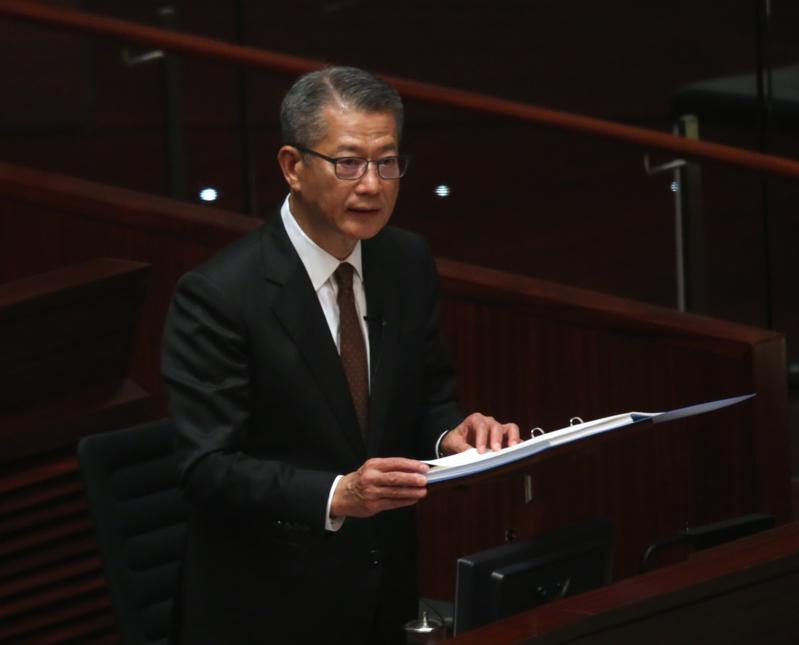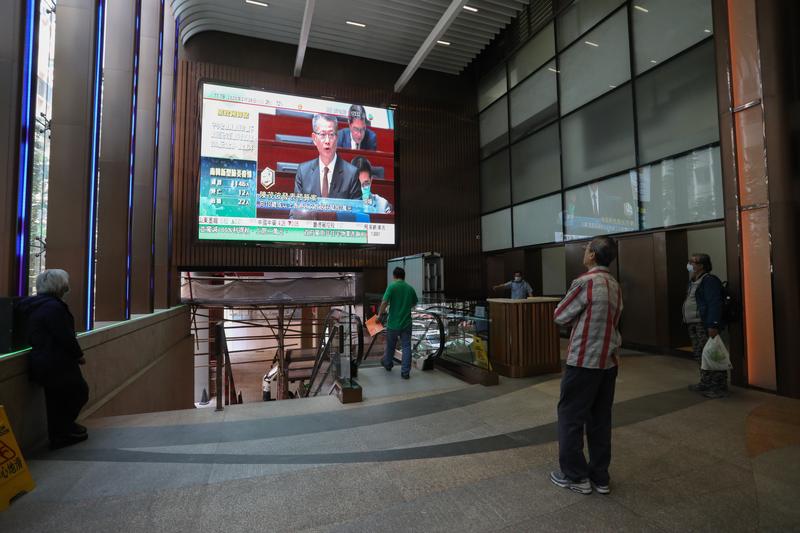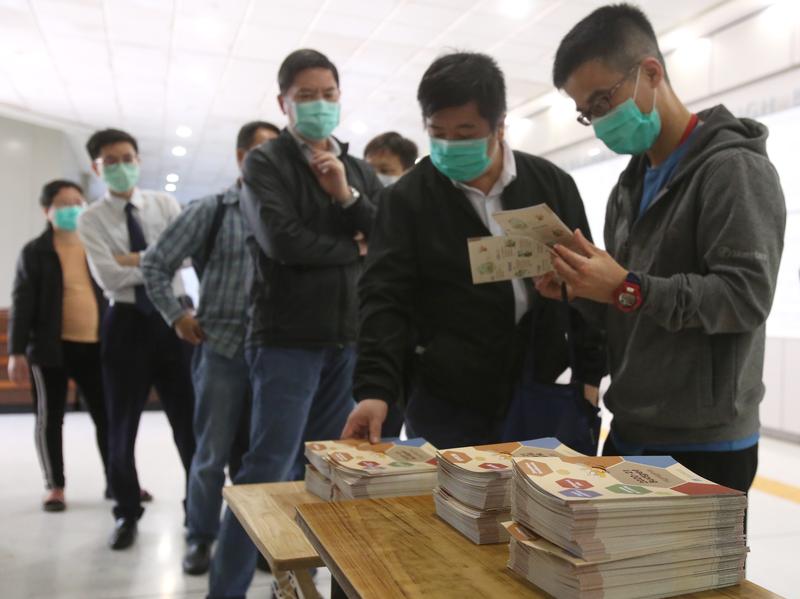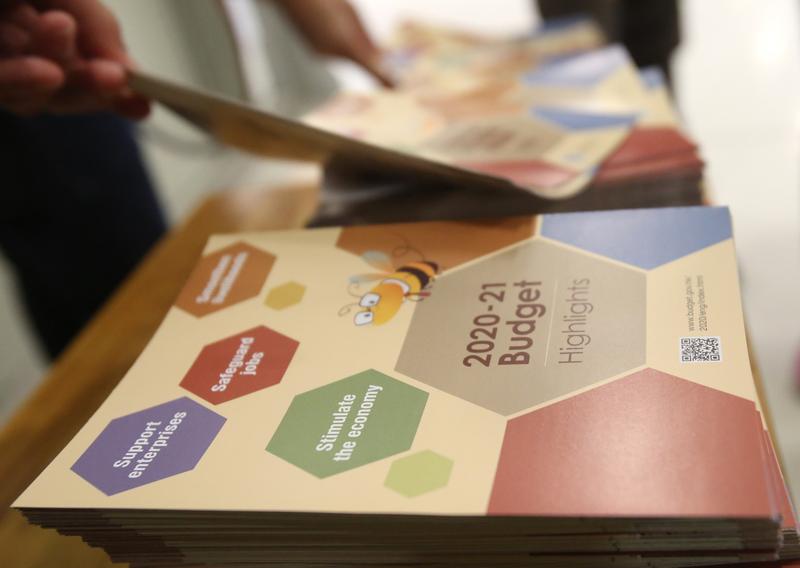 Hong Kong's Financial Secretary Paul Chan Mo-po delivers the 2020 budget speech at the Legislative Council in Hong Kong, Feb 26, 2020. (PARKER ZHENG / CHINA DAILY)
Hong Kong's Financial Secretary Paul Chan Mo-po delivers the 2020 budget speech at the Legislative Council in Hong Kong, Feb 26, 2020. (PARKER ZHENG / CHINA DAILY)
HONG KONG - Hong Kong Financial Secretary Paul Chan Mo-po unveiled the much-awaited 2020-21 Budget Wednesday, pledging economic relief measures worth HK$120 billion as the city reels from an outbreak of COVID-19 caused by a novel coronavirus after months of anti-government protests.
Chan buttressed the government’s earlier policies to shore up the city’s economy by pledging cash handout for each adult Hong Kong permanent resident, generous tax concessions and enterprise support, and initiatives to resolutely fight the epidemic.
Chan said he expects the fiscal deficit for next year will be HK$139.1 billion, accounting for 4.8 percent of GDP.
INFOGRAPHIC: HK budget at a glance
As he forecast a deficit of HK$37.8 billion for 2019-20 - Hong Kong's first in 15 years - Chan said the city's economic fundamentals remained solid and with adequate macroeconomic support policies on the Chinese mainland, Hong Kong was positioned to weather global uncertainties once the epidemic blew over. He said the city’s fiscal reserves were expected to stand at HK$1,133.1 billion by 31 March, 2020.
As widely anticipated, Financial Secretary Paul Chan proposed disbursing a cash handout of HK$10,000 to each adult Hong Kong permanent resident
He said while the city's economy faced enormous challenges, he said, "I forecast our economy will grow by -1.5 percent to 0.5 percent in real terms in 2020."
ALSO READ: HK economy slips 1.2% in 2019, first contraction in a decade
He also forecast that the headline inflation rate and underlying inflation rate will ease to 1.7 percent and 2.5 percent, respectively, in 2020.
Industry concessions
In his speech at Hong Kong's Legislative Council, Chan introduced a concessionary low-interest loan under the SME Financing Guarantee Scheme, under which 100 percent guarantee will be provided by the government.
ALSO READ: Pressure mounts for HK SMEs to be given a lifeline
 Residents watch Hong Kong Financial Secretary Paul Chan Mo-po delivering his Budget speech on a giant TV screen in Causeway Bay, Hong Kong, Feb 26, 2020. (CALVIN NG / CHINA DAILY)
Residents watch Hong Kong Financial Secretary Paul Chan Mo-po delivering his Budget speech on a giant TV screen in Causeway Bay, Hong Kong, Feb 26, 2020. (CALVIN NG / CHINA DAILY)
The Hong Kong government will provide guarantee of up to HK$20 billion under this concessionary loan scheme.
Chan introduced a concessionary low-interest loan under the SME Financing Guarantee Scheme, under which 100 percent guarantee will be provided by the government
He also pledged to reduce profits tax for assessment 2019/20 year by 100 percent, subject to a ceiling of HK$20,000, aiming to benefit 141,000 taxpayers.
In another significant move, Chan proposed to waive the business registration fees for 2020-21, aimed at benefiting 1.5 million business operators as well as Companies Registry registration fees for two years.
He proposed to waive rates for non-domestic properties for 2020-21, subject to a ceiling of HK$5,000 per quarter in the first two quarters and a ceiling of HK$1,500 per quarter in the remaining two.
READ MORE: HK companies have no safety net in fight for survival
Chan said the government proposed to reduce rental by 50 percent for another six months for eligible tenants of government properties, government land and EcoPark as also waive 75 percent of water and sewage charges and subsidize 75 percent of electricity bill of each eligible non-domestic household account.
The government proposed to spend HK$18.3 billion for measures aimed to support enterprises.
This apart, the government will earmark an additional annual funding of HK$30 million to enhance employment programs so that more elderly, young people and persons with disabilities are inducted into the city's workforce.
 Residents line up for booklets featuring details of the 2020-21 Hong Kong Budget in Admiralty, Hong Kong, Feb 26, 2020. (PARKER ZHENG / CHINA DAILY)
Residents line up for booklets featuring details of the 2020-21 Hong Kong Budget in Admiralty, Hong Kong, Feb 26, 2020. (PARKER ZHENG / CHINA DAILY)
Welfare push
In his budget speech, Chan proposed one-off special allowance payable from the Anti-epidemic Fund for about 200,000 eligible low-income households.
As widely anticipated, Chan proposed disbursing a cash handout of HK$10,000 to each adult Hong Kong permanent resident.
Chan proposed to reduce personal and salaries tax by 100 percent during 2019/20, subject to a ceiling of HK$20,000 benefiting 1.95 million taxpayers
He also proposed to reduce personal and salaries tax by 100 percent during 2019/20, subject to a ceiling of HK$20,000 benefiting 1.95 million taxpayers and waive residential properties rates for four quarters of 2020-21, subject to a ceiling of HK$1,500 per quarter for each rateable property, involving 2.93 million domestic properties in all.
READ MORE: Cash, tax cuts on the table in HK's recession budget
All eligible social security recipients were pledged additional subsidy equal to one month's standard payout under Comprehensive Social Security Assistance, Old Age Allowance, Old Age Living Allowance or Disability Allowance. Recipients of Work Incentive Transport Subsidy will similarly benefit.
The government also proposed to pay one month's rent for lower income tenants living in public rental units of the Hong Kong Housing Authority and the Hong Kong Housing Society.
Chan said the government also proposed to pay the examination fees for school candidates sitting the 2021 Hong Kong Diploma of Secondary Education Examination, involving an expenditure of about HK$150 million.
 Passersby pick up booklets featuring details of the 2020-21 Hong Kong Budget in Admiralty, Hong Kong, Feb 26, 2020. (PARKER ZHENG / CHINA DAILY)
Passersby pick up booklets featuring details of the 2020-21 Hong Kong Budget in Admiralty, Hong Kong, Feb 26, 2020. (PARKER ZHENG / CHINA DAILY)
Health care support
In his speech, Chan pledged a total recurrent funding of HK$75 billion to the Hospital Authority in 2020-2021, representing an increase of 35 percent over the 2017-18 outlay of HK$55.6 billion. Noting that "social incidents and the novel coronavirus epidemic have affected the mental health of many people in Hong Kong", Chan pledged to allocate sufficient resources to the Food and Health, Labour and Welfare bureaus.
Housing
In his speech, Chan said the Hong Kong Mortgage Corp. will launch a pilot program offering fixed-rate mortgage loans through the banks to provide homebuyers with more options and reduce risk of interest rate volatility.
Chan said the 2020-21 Land Sale Programme comprises 15 residential sites, capable of providing about 7,500 residential units. He also said the private sector is expected to complete about 19,600 private residential units annually from 2020 to 2024.
Multi-pronged support
“In view of the tough economic environment, we will adopt an expansionary fiscal stance and make optimal use of our fiscal reserves to implement counter-cyclical measures,” Chan said. The objective is “supporting enterprises, safeguarding jobs, stimulating the economy and relieving people’s burden, so as to help Hong Kong tide over the difficulties,” he said.
READ MORE: Hong Kong jobless rate rises to 3.4%, highest since 2016
Chan made special mention of the possible imposition of a global minimum tax rate that may undermine Hong Kong’s competitive tax regime.
Chan pledged HK$700 million to promote tourism in the city once the coronavirus epidemic blows over
He pledged HK$700 million to promote tourism in the city once the coronavirus epidemic blows over and pledged another HK$6.5 billion for harbourfront development initiatives.
On the innovation front, he proposed to earmark HK$3 billion for a possible Phase 2 of the Science Park expansion program, as well as a possible third InnoHK research cluster at the park. This apart, he also pledged HK$2 billion for a re-industrialization plan to support manufacturers setting up new smart production lines.
Also, HK$100 million has been set aside to develop an integrated digital platform for all public works projects.
Chan said HK$2 billion had been earmarked for a pilot project to subsidize e-charging infrastructure in car parks and another HK$80 billion to pilot the use of electric public light buses.
For investors, the government proposes a waiver on stamp duty on stock transfers paid by exchange-traded fund market makers.
Chan promised to increase the sports subvention from the current HK$300 million to more than HK$500 million a year over the next four years.
Chan ended his speech on a conciliatory and optimistic note, saying, “In conclusion, Hong Kong may have all sorts of shortcomings, but it is our home which allows diversity and freedom of development. Even if we have been disappointed, we can choose to feel hopeful for our future.”


